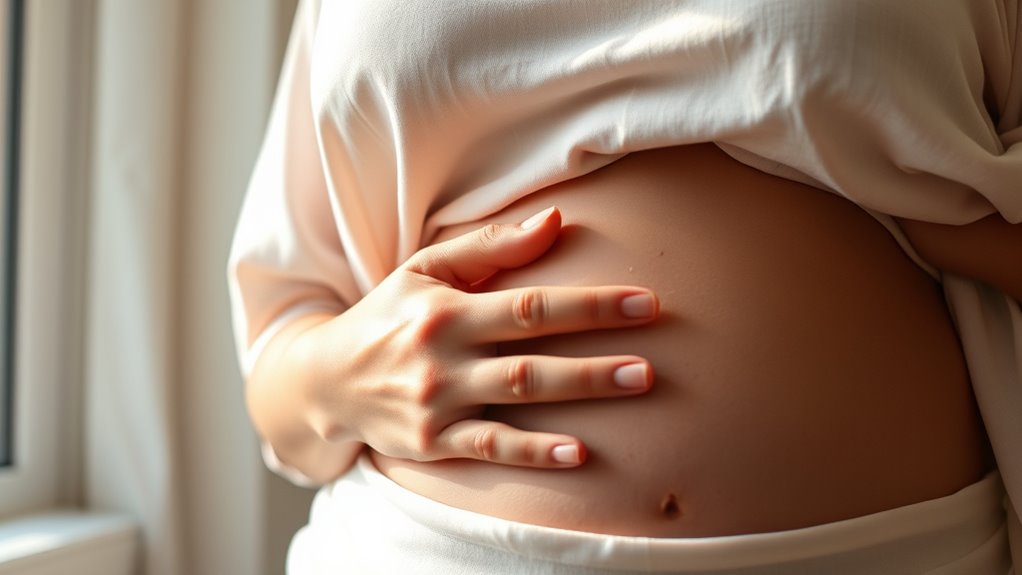Many women overlook subtle signs like implantation bleeding, which appears as light pink or brownish spots around their expected period, and increased urination, often starting early in pregnancy due to hormonal changes. These symptoms can occur before more obvious signs like nausea or fatigue. Tracking these small changes helps you recognize pregnancy sooner. If you want to learn more about these often-missed clues, keep exploring what your body might be telling you.
Key Takeaways
- Spotting or light bleeding around the expected period may indicate implantation rather than a period.
- Increased urination can occur early due to hormonal changes, often overlooked as a pregnancy sign.
- Subtle body changes like breast tenderness or fatigue often go unnoticed before more obvious symptoms appear.
- Mild cramping or uterine sensations might be early signs of implantation and pregnancy.
- Changes in basal body temperature, such as sustained elevation, can signal pregnancy before other symptoms emerge.

Discovering you’re pregnant often begins with noticing subtle signs that your body is changing. One of the earliest clues can be implantation bleeding, which some women mistake for a light period or spotting. This usually happens around the time your period is due, but it’s often much lighter and shorter than a regular flow. You might see faint pink or brownish spots on your underwear or toilet paper. Don’t ignore it, especially if it occurs alongside other early symptoms. Implantation bleeding signals that the fertilized egg has attached itself to your uterine lining, a vital step in pregnancy. While not all women experience this, if you do, it’s a significant early sign that your body is starting to adapt to pregnancy.
Along with spotting, increased urination is another subtle symptom that many women overlook in the early stages. You might find yourself heading to the bathroom more frequently than usual, even during the night. This change often begins around the sixth or eighth week but can start sooner. The increased urination happens because your body begins producing more blood to support the developing pregnancy, which causes your kidneys to process more fluid. As a result, your bladder fills more quickly, and you feel the urge to go more often. Many women dismiss this as just needing to drink more fluids or as a side effect of caffeine or other factors. However, if you notice a sudden increase in bathroom trips without a clear reason, it could be an early pregnancy symptom.
It’s important to pay attention to these signals because they often occur before more noticeable symptoms like nausea or fatigue set in. Recognizing implantation bleeding and increased urination as early signs can help you confirm pregnancy sooner and prepare for the changes ahead. Keep track of any spotting, how often you’re urinating, and any other subtle shifts in your body. These clues, combined with a missed period or a pregnancy test, can give you a clearer picture of what’s happening inside. Many women overlook these early signs because they seem minor or easily explainable by other causes. Yet, understanding that these are common early symptoms can ease your mind and encourage you to seek confirmation or medical advice early on. Paying close attention to your body’s signals ensures you don’t miss the tiny but meaningful signs that say you might be pregnant, setting the stage for a healthier pregnancy journey.
Additionally, staying aware of early pregnancy detection methods can help you verify these signs more confidently.
Frequently Asked Questions
Can Early Pregnancy Symptoms Occur Without a Missed Period?
Yes, early pregnancy symptoms can occur without a missed period. You might experience implantation bleeding, which happens when the fertilized egg attaches to your uterus, and hormonal changes can cause symptoms like breast tenderness or fatigue. These signs can appear before your period is due, so don’t rely solely on a missed period to suspect pregnancy. Pay attention to your body’s signals and consider testing if you notice these early signs.
Are There Symptoms That Resemble Premenstrual Signs?
You might notice symptoms that resemble premenstrual signs, causing premenstrual confusion. These can include mood swings, breast tenderness, or mild cramping, which often occur around ovulation or before your period. Since these signs overlap with early pregnancy symptoms, it’s easy to mistake ovulation signs for pregnancy. Pay close attention to your cycle; if symptoms persist or change, consider taking a pregnancy test to clarify what’s happening.
How Soon Can Pregnancy Be Confirmed With Symptoms Alone?
Think of your body as a delicate clock, ticking with hormonal changes. You might notice symptoms like implantation bleeding as early as 6-12 days after conception. While these signs can hint at pregnancy, they aren’t definitive. To confirm, it’s best to wait until your missed period or take a pregnancy test, which detects hCG levels. Relying solely on symptoms can be like reading tea leaves—uncertain and unreliable.
Do Symptoms Vary Between First-Time and Experienced Mothers?
Symptoms can vary between first-time and experienced mothers because hormonal changes influence symptom awareness differently. As a first-time mother, you might notice symptoms more acutely or be more anxious about changes, while experienced mothers often recognize early signs confidently. Your body’s response to hormonal fluctuations shapes these differences, making awareness of subtle symptoms key. Knowing this helps you better understand your unique pregnancy experience, regardless of whether it’s your first or fifth.
Can Stress Cause Early Pregnancy Symptoms?
Think of stress as a storm cloud that stirs the sky of your body. It can trigger effects like hormone fluctuations, which may mimic early pregnancy symptoms. So, yes, stress effects can cause symptoms such as fatigue, nausea, or tender breasts, making you wonder if you’re pregnant. Managing stress helps keep your body’s weather calm, reducing confusing signals and supporting a healthy start to pregnancy.
Conclusion
As your body whispers its secrets, paying attention turns your journey into a gentle dance with life’s new chapter. Those subtle signs are like delicate brushstrokes on a canvas, painting a picture of change and possibility. By trusting your instincts and recognizing these early signals, you’ll navigate this beautiful chapter with confidence. Embrace each moment, for soon, your story blossoms into a vibrant masterpiece, filled with hope, wonder, and the promise of new beginnings.









